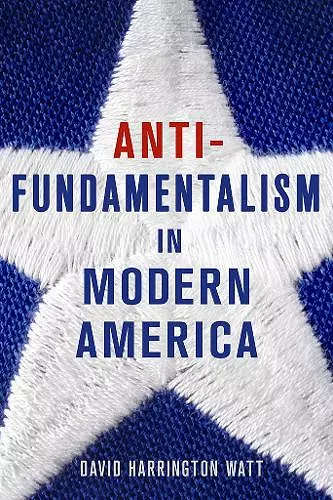Antifundamentalism in Modern America
Format:Hardback
Publisher:Cornell University Press
Published:9th May '17
Currently unavailable, and unfortunately no date known when it will be back

David Harrington Watt's Antifundamentalism in Modern America gives us a pathbreaking account of the role that the fear of fundamentalism has played—and continues to play—in American culture. Fundamentalism has never been a neutral category of analysis, and Watt scrutinizes the various political purposes that the concept has been made to serve. In 1920, the conservative Baptist writer Curtis Lee Laws coined the word "fundamentalists." Watt examines the antifundamentalist polemics of Harry Emerson Fosdick, Talcott Parsons, Stanley Kramer, and Richard Hofstadter, which convinced many Americans that religious fundamentalists were almost by definition backward, intolerant, and anti-intellectual and that fundamentalism was a dangerous form of religion that had no legitimate place in the modern world. For almost fifty years, the concept of fundamentalism was linked almost exclusively to Protestant Christians. The overthrow of the Shah of Iran and the establishment of an Islamic republic led to a more elastic understanding of the nature of fundamentalism. In the late 1970s and early 1980s, Americans became accustomed to using fundamentalism as a way of talking about Muslims, Jews, Hindus, Sikhs, and Buddhists, as well as Christians. Many Americans came to see Protestant fundamentalism as an expression of a larger phenomenon that was wreaking havoc all over the world. Antifundamentalism in Modern America is the first book to provide an overview of the way that the fear of fundamentalism has shaped U.S. culture, and it will lead readers to rethink their understanding of what fundamentalism is and what it does.
[H]is prose is crisp and easily accessible from both popular and academic vantages. What's even more impressive is the fact that such a style embodies decades of nuanced thinking and discernment when it comes to the academic study of global fundamentalism. In these senses, Watt's work embodies what scholarly publishing is capable of in the early decades of the twenty-first century: engaging prose backed by dense networks of historiographic insight and archival density.... In short, Antifundamentalism in Modern America is a significant contribution to at least three separate but interrelated fields of academic inquiry: American religious history, religious studies, and American history. For historians writ large, Watt's text offers a well-supported argument through the use of multiple archives and close readings of primary source material.
* H-Net *Watt is a keenly observant commentator who effortlessly blends media analysis with intellectual history, archival work with examinations of contemporary events. His prose is engaging without sacrificing depth or rigor. Perhaps most impressively, Watt is an even-handed and even generous critic of those with whom he disagrees. When it comes to the subject of fundamentalism, such equipoise is almost astonishing. But that is part of the point. Only by ratcheting down the rhetoric can one begin to dismantle the machinery that has built the targeting of ostensible fundamentalists—particularly Muslims, and often violently—into a pillar of statecraft at home and abroad.
* Reading Religion *The rhetoric of antifundamentalism is unlikely to die as long as the behaviors that vex antifundamentalists persist. And while the concept of global fundamentalism is, as Watt persuasively argues, far more problematic, it, too, is likely to live on at least until the fears it engenders can be given a new name.
* Journal of Church and State *Watt is methodical and fair-minded in laying out the problems involved in usage of the word fundamentalism and the history of its usage.... His book is instructive and important as a caution against oversimplified categories of interpretation.
* Canadian Journal of History *Watt strives for evenhandedness even as he warns against the pitfalls in the notion of global fundamentalism. Antifundamentalism in Modern America is a careful and timely book that is worth thoughtfully reading.
* The Journal of Southern HistoISBN: 9780801448270
Dimensions: 229mm x 152mm x 24mm
Weight: 907g
240 pages